安徽省2021年中考英语语法专题突破七形容词和副词课件(49张PPT)
文档属性
| 名称 | 安徽省2021年中考英语语法专题突破七形容词和副词课件(49张PPT) |  | |
| 格式 | zip | ||
| 文件大小 | 1.2MB | ||
| 资源类型 | 教案 | ||
| 版本资源 | 通用版 | ||
| 科目 | 英语 | ||
| 更新时间 | 2021-01-01 10:43:54 | ||
图片预览

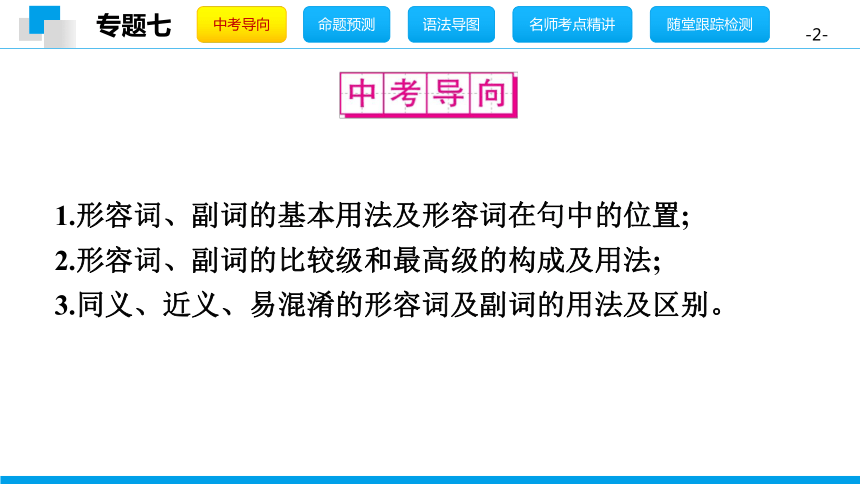
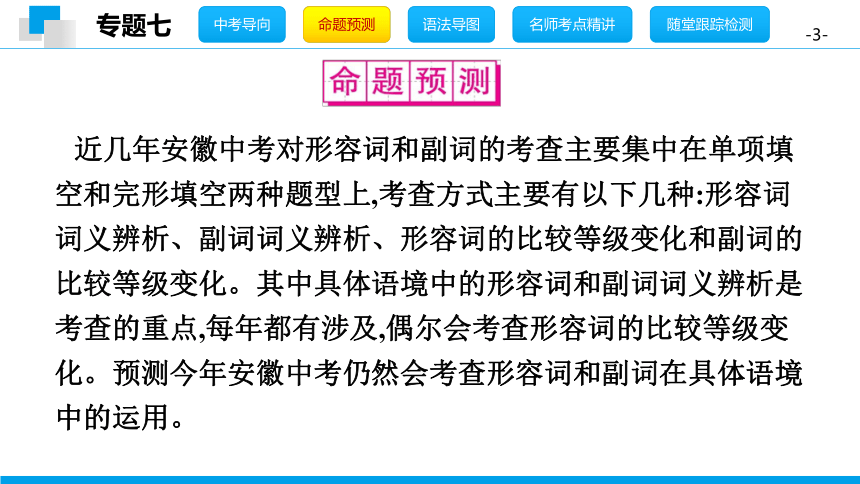
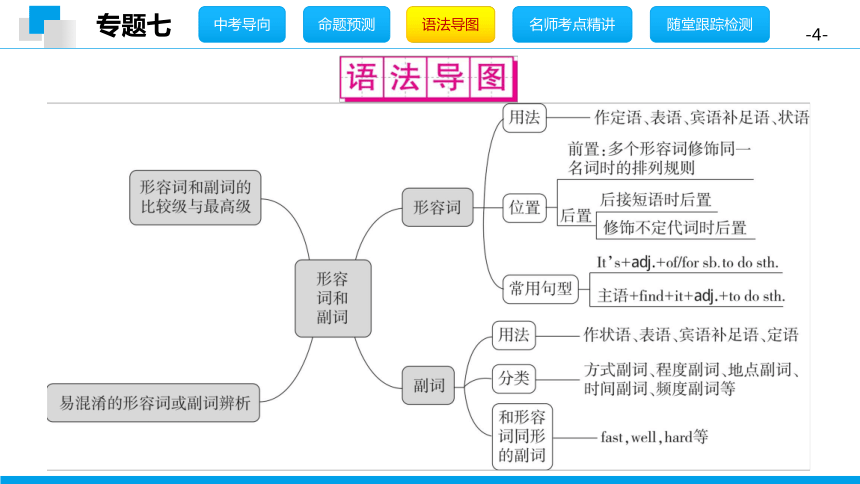
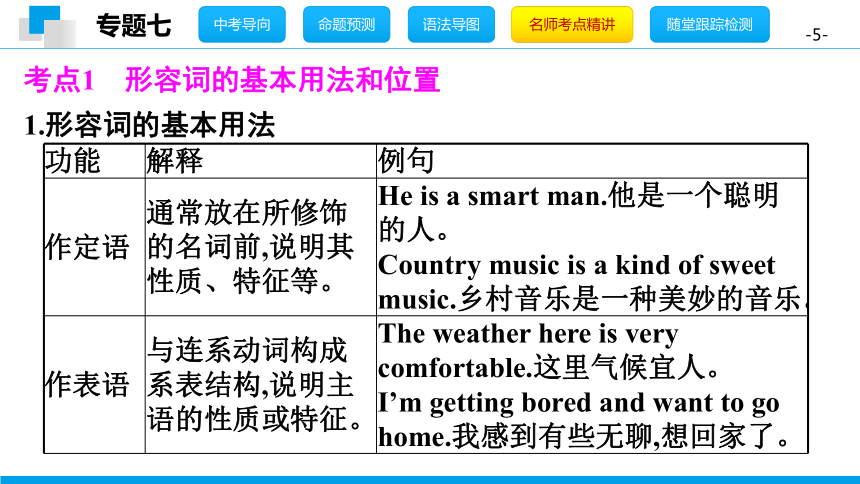
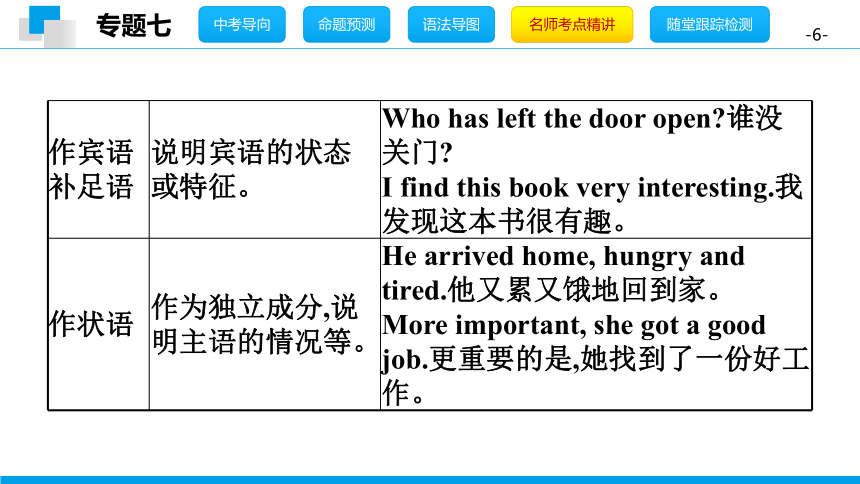
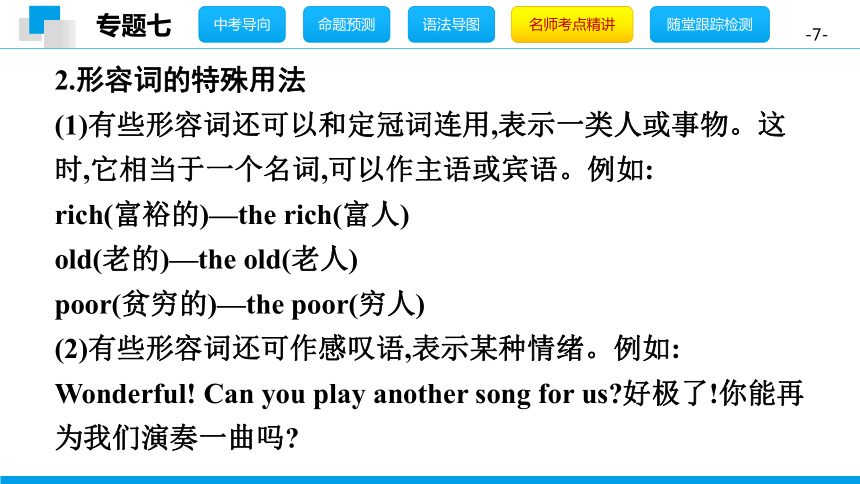
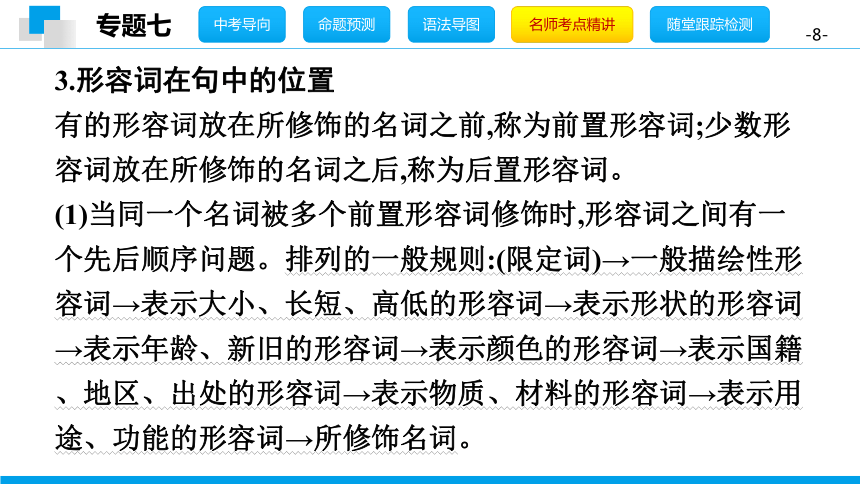
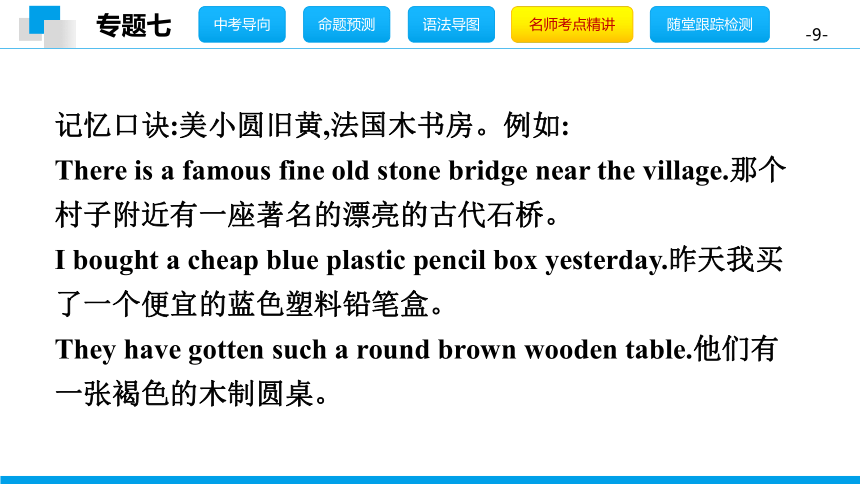
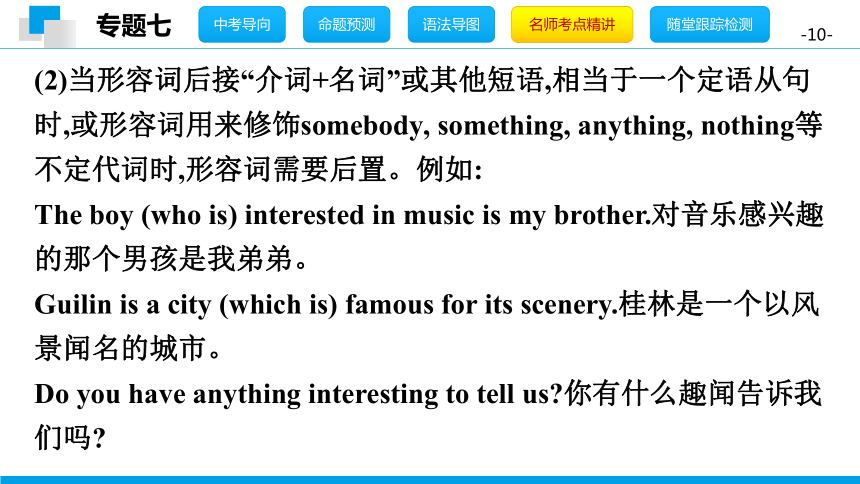
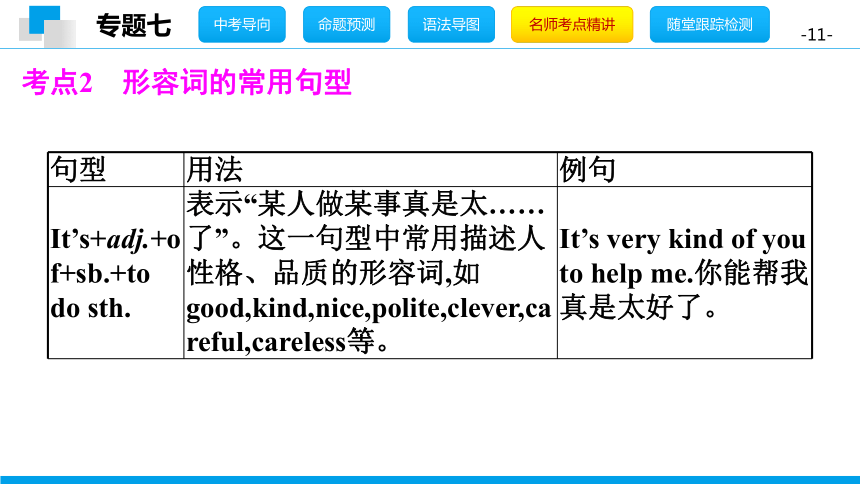
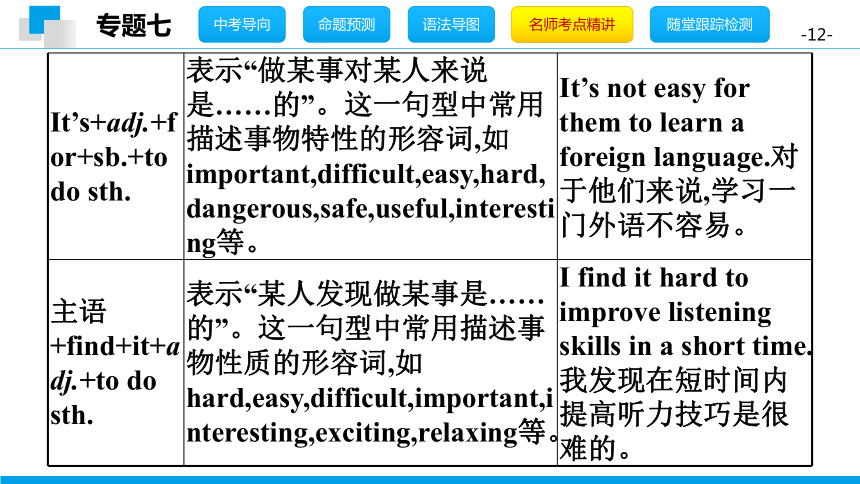
文档简介
(共49张PPT)
专题七 形容词和副词
1.形容词、副词的基本用法及形容词在句中的位置;
2.形容词、副词的比较级和最高级的构成及用法;
3.同义、近义、易混淆的形容词及副词的用法及区别。
近几年安徽中考对形容词和副词的考查主要集中在单项填空和完形填空两种题型上,考查方式主要有以下几种:形容词词义辨析、副词词义辨析、形容词的比较等级变化和副词的比较等级变化。其中具体语境中的形容词和副词词义辨析是考查的重点,每年都有涉及,偶尔会考查形容词的比较等级变化。预测今年安徽中考仍然会考查形容词和副词在具体语境中的运用。
考点1 形容词的基本用法和位置
1.形容词的基本用法
功能
解释
例句
作定语
通常放在所修饰的名词前,说明其性质、特征等。
He
is
a
smart
man.他是一个聪明的人。
Country
music
is
a
kind
of
sweet
music.乡村音乐是一种美妙的音乐。
作表语
与连系动词构成系表结构,说明主语的性质或特征。
The
weather
here
is
very
comfortable.这里气候宜人。
I’m
getting
bored
and
want
to
go
home.我感到有些无聊,想回家了。
作宾语
补足语
说明宾语的状态或特征。
Who
has
left
the
door
open?谁没关门?
I
find
this
book
very
interesting.我发现这本书很有趣。
作状语
作为独立成分,说明主语的情况等。
He
arrived
home,
hungry
and
tired.他又累又饿地回到家。
More
important,
she
got
a
good
job.更重要的是,她找到了一份好工作。
2.形容词的特殊用法
(1)有些形容词还可以和定冠词连用,表示一类人或事物。这时,它相当于一个名词,可以作主语或宾语。例如:
rich(富裕的)—the
rich(富人)
old(老的)—the
old(老人)
poor(贫穷的)—the
poor(穷人)
(2)有些形容词还可作感叹语,表示某种情绪。例如:
Wonderful!
Can
you
play
another
song
for
us?好极了!你能再为我们演奏一曲吗?
3.形容词在句中的位置
有的形容词放在所修饰的名词之前,称为前置形容词;少数形容词放在所修饰的名词之后,称为后置形容词。
(1)当同一个名词被多个前置形容词修饰时,形容词之间有一个先后顺序问题。排列的一般规则:(限定词)→一般描绘性形容词→表示大小、长短、高低的形容词→表示形状的形容词→表示年龄、新旧的形容词→表示颜色的形容词→表示国籍、地区、出处的形容词→表示物质、材料的形容词→表示用途、功能的形容词→所修饰名词。
记忆口诀:美小圆旧黄,法国木书房。例如:
There
is
a
famous
fine
old
stone
bridge
near
the
village.那个村子附近有一座著名的漂亮的古代石桥。
I
bought
a
cheap
blue
plastic
pencil
box
yesterday.昨天我买了一个便宜的蓝色塑料铅笔盒。
They
have
gotten
such
a
round
brown
wooden
table.他们有一张褐色的木制圆桌。
(2)当形容词后接“介词+名词”或其他短语,相当于一个定语从句时,或形容词用来修饰somebody,
something,
anything,
nothing等不定代词时,形容词需要后置。例如:
The
boy
(who
is)
interested
in
music
is
my
brother.对音乐感兴趣的那个男孩是我弟弟。
Guilin
is
a
city
(which
is)
famous
for
its
scenery.桂林是一个以风景闻名的城市。
Do
you
have
anything
interesting
to
tell
us?你有什么趣闻告诉我们吗?
考点2 形容词的常用句型
句型
用法
例句
It’s+adj.+of+sb.+to
do
sth.
表示“某人做某事真是太……了”。这一句型中常用描述人性格、品质的形容词,如good,kind,nice,polite,clever,careful,careless等。
It’s
very
kind
of
you
to
help
me.你能帮我真是太好了。
It’s+adj.+for+sb.+to
do
sth.
表示“做某事对某人来说是……的”。这一句型中常用描述事物特性的形容词,如important,difficult,easy,hard,dangerous,safe,useful,interesting等。
It’s
not
easy
for
them
to
learn
a
foreign
language.对于他们来说,学习一门外语不容易。
主语+find+it+adj.+to
do
sth.
表示“某人发现做某事是……的”。这一句型中常用描述事物性质的形容词,如hard,easy,difficult,important,interesting,exciting,relaxing等。
I
find
it
hard
to
improve
listening
skills
in
a
short
time.我发现在短时间内提高听力技巧是很难的。
考点3 副词的基本用法和分类
1.副词的基本用法
副词用来修饰动词、形容词、其他副词或整个句子,表示时间、地点、程度、方式等。副词在句中可作状语、表语、宾语补足语、定语。例如:
Luckily,I
got
there
on
time.幸运的是,我准时到了那里。(luckily作状语)
Let’s
be
out!我们出去吧!(out作表语)
Let
him
out.让他出去。(out作补语)
People
here
are
very
friendly.这里的人们非常友好。(here作定语)
2.副词的分类:副词按词义可分为以下几类
(1)方式副词,如well,
fast,
slowly,
carefully,
quickly,
quietly等。
(2)程度副词,如so,
very,
much,
rather,
quite等。
(3)地点副词,如here,
there,
out,
somewhere等。
(4)时间副词,如early,
soon,
now,
then,
recently等。
(5)频度副词,如often,
usually,
sometimes,
never等。
(6)连接副词,如however,
then,
where等。
(7)疑问副词,如where,
how,
why等。
(8)关系副词,如where,
when,
why等。
3.与形容词同形的副词
英语中有不少副词与形容词同形,要注意积累区分。例如:
fast(adj.快的)—fast(adv.快速地)
well(adj.健康;状态良好)—well(adv.好;令人满意地)
hard(adj.坚固的;坚硬的)—hard(adv.努力地;费力地)
有些副词有两种形式,一种与形容词同形,一种在形容词基础上加后缀?ly构成,要注意区别它们。
(1)含义相同。此时两种形式的副词可以互换。例如:
The
stars
shines
bright/brightly.星光闪耀。
(2)含义不同。此时两种形式的副词不可以互换。例如:
The
exams
are
drawing
near.考试越来越近了。
The
bottle
is
nearly
empty.这瓶子差不多空了。
(3)含义相似。这种情况下,一般与形容词同形的副词意义较具体,而加后缀?ly的副词意义较抽象。例如:
The
door
was
wide
open.门四敞大开。
The
idea
is
now
widely
accepted.这个思想现在已获得普遍接受。
考点4 形容词和副词比较级与最高级的变化规则
1.规则变化
构成方式
原级
比较级
最高级
一般在词尾加?er或者?est
tall
slow
taller
slower
tallest
slowest
以不发音的e结尾的单音节词,加?r或?st
nice
late
nicer
later
nicest
latest
以“辅音字母+y”结尾的双音节词,把y变为i,再加?er或?est
happy
early
happier
earlier
happiest
earliest
重读闭音节词,如末尾只有一个辅音字母,先双写这个辅音字母,再加?er或?est
big
hot
thin
bigger
hotter
thinner
biggest
hottest
thinnest
部分双音节词或多音节词,在该词前直接加more/less或most/least
useful
?
carefully
more/less
useful
more/less
carefully
most/least
useful
most/
least
carefully
2.不规则变化
原级
比较级
最高级
good/well
better
best
bad/ill/badly
worse
worst
many/much
more
most
little
less
least
far
farther/further
farthest/furthest
old
older/elder
oldest/eldest
某些单、双音节形容词和副词变为比较级或最高级时只能加more或most,具体见下表:
原级
比较级
最高级
real
more
real
most
real
tired
more
tired
most
tired
pleased
more
pleased
most
pleased
often
more
often
most
often
3.巧记形容词和副词的比较级变化规则
(1)规则变化:
比较级,有变化,一般词尾加?er;
词尾不发音e简单化,之后另把?r加。
辅音字母+y型,改y为i,加?er;
一辅重读闭音节,词尾字母应双写。
双、多音节更容易,之前加more就可以。
(2)不规则变化:
“好”(good/well)是better;
“多”(many/much)是more。
“坏/病”(bad/ill)是worse;
“老/远”(old/far)变化有两个。
注意:
①far的两个比较级的区别:farther强调距离远;further强调程度深。
②old的两个比较级的区别:older指年龄的大小;elder通常指家庭成员之间的长幼关系。
考点5 形容词和副词的比较等级的常用句型
1.形容词和副词原级的常用句型
句型
用法
例句
A+谓语+as+形容词/副词原级+as+B
表示比较的双方程度相同,意为“A像B一样……”。
He
sings
as
well
as
his
teacher.他歌唱得和他的老师一样好。
A+谓语+not
as/so+形容词/副词原级+as+B
表示比较的双方程度不相同,意为“A不如B……”。
The
girl
doesn’t
run
as
quickly
as
the
boy.那个女孩跑得不如那个男孩快。
2.形容词和副词比较级的常用句型
可以修饰比较级的词有much,
a
lot,
far,
a
little,
a
bit,
even,
still等。常用的句型结构如下:
句型
用法
例句
A+谓语+形容词/副词比较级+than+B
表示“A比B……”。
Jim
is
taller
than
Li
Lei.吉姆比李雷个子高。
Jim
runs
faster
than
Li
Lei.吉姆比李雷跑得快。
形容词/副词比较级+and+形容词/副词比较级
表示“越来越……”。
He
is
getting
taller
and
taller.他长得越来越高了。
the+形容词/副词比较级,the+形容词/副词比较级
表示“越……就越……”。
The
harder
you
work,
the
greater
progress
you
will
make.你越用功,进步就越大。
否定词+比较级(+than)(否定词有not,no,never,nothing等,也可用can’t/couldn’t+比较级)
表示“没有比……更……的了;是最……的了”,比较级形式表达最高级含义。
I
can’t
agree
with
you
more.我非常同意你的观点。
3.形容词最高级的常用句型
句型
用法
例句
主语+谓语+the+形容词最高级+in/of/among短语或从句
表示“……是……中最……的”。of和among后面接三个或者三个以上的人或物;in后面接一个组织或单位集体等。
Among
all
the
subjects,English
is
the
most
interesting
I
think.在所有学科中,我认为英语是最有趣的。
one
of+the+形容词最高级+可数名词复数+in/of短语或从句
表示“最……之一”。
She
is
one
of
the
best
runners
in
the
world.她是世界上最优秀的跑者之一。
考点6 易混淆的形容词或副词辨析
1.so和such
易混词
用法
例句
so
修饰形容词或副词。so修饰的形容词后可以接可数名词单数,其结构是“so+形容词+a(n)+可数名词单数”。如果可数名词复数前有many,few修饰或不可数名词前有much,little修饰,用so不用such。
He
is
so
clever
a
boy.他是一个如此聪明的男孩。
such
修饰可数名词单、复数或不可数名词,名词前可以有形容词作定语,其结构是“such+a(n)+形容词+可数名词单数”或“such+形容词+可数名词复数/不可数名词”。
Jane
and
Ted
are
such
nice
people.简和特德真友善。
2.also,too,as
well和either
副词
用法
例句
also
意为“并且;也”,用于肯定句中,常置于be动词、情态动词、助动词之后,行为动词之前。
My
father
is
a
teacher.My
mother
is
also
a
teacher.我的爸爸是一名老师。我的妈妈也是一名老师。
too
意为“也”,用于肯定句中,置于句末。
You
could
be
a
winner,
too.你也可以成为胜者。
as
well
意为“也,又”时,用于肯定句中,置于句末,句子之间没有逗号。
I
write
songs
and
I
play
the
guitar
as
well.我写歌,也弹吉他。
either
意为“也”,用于否定句中,置于句末。
I
can’t
speak
French.Jenny
can’t
speak
French,either.我不会说法语。珍妮也不会。
3.ago和before
副词
用法
例句
ago
表示以现在为起点的以前,与具体时间连用,常与一般过去时连用,不可以单独使用。
He
set
off
for
work
an
hour
ago.他一小时前动身去上班了。
before
泛指以前,常用于完成时,可以单独使用。
He
is
much
happier
than
before.他比以前快乐多了。
4.alone和lonely
易混词
用法
例句
alone
作形容词和副词,只陈述客观事实,不带感彩,表示独自一人,不表示“孤独”,通常用作表语或宾语补足语。
He
was
alone
in
the
house.他独自一人在屋子里。
I
found
him
alone
in
bed.我发现他一个人在床上。
lonely
只能作形容词,带有感彩,意为“孤独的”。
He
felt
very
lonely
when
he
left
his
family.当他离开家后,他感到非常孤独。
5.hard和hardly,high和highly,deep和deeply
易混词
用法
例句
hard/
hardly
hard
作副词时,意为“努力地;猛烈地”;作形容词时,意为“困难的;坚硬的”。
hardly作副词,意为“几乎不;几乎没有”。
He
works
hard
and
makes
much
progress.他努力学习,并取得了很大的进步。
He
can
hardly
speak
English.他几乎不会说英语。
high/
highly
high作形容词时,意为“高的”;作副词时意为“高地”,指具体的高。
highly作副词,意为“高度地”,指抽象的高。
The
mountain
is
about
three
thousand
meters
high.那座山有3
000米高。
He
was
highly
thought
of
by
his
students.他得到了学生们的高度赞扬。
deep/
deeply
deep作形容词,意为“深的”;作副词时,意为“深地”,常用于修饰静止状态、介词短语或表示深夜等。
deeply作副词,意为“深深地”,常用于修饰形容词、过去分词、带有感彩的动词等。
He
sat
there
deep
in
thought.他坐在那儿沉思。
He
was
moved
deeply
by
the
moving
story.他被那个感人的故事深深地打动了。
Ⅰ.单项填空
1.There
is
a
smile
on
Mrs.
Smith’s
face.
I
think
she
must
be
with
my
work.(
B
)?
A.strict
B.pleased
C.angry
D.sorry
2.It’s
too
late
to
go
out
now. ,it’s
starting
to
rain.
(
B
)?
A.Though
B.Besides
C.However
D.Instead
3.The
population
of
China
is
much than
that
of
England.(
A
)?
A.larger
B.less
C.more
D.fewer
4.—Look
at
the
bird
over
there!
It’s
so
beautiful!
—Wow!It’s
a
rare(罕见的)
crane.
It
appears
in
this
area.(
C
)?
A.always
B.usually
C.seldom
D.often
5.—I
think
it’s
necessary
to
learn
how
to
work
in
groups.
—I
quite
agree.
Sometimes
it’s
even than
grades.
(
B
)?
A.less
important
B.more
important
C.the
least
important
D.the
most
important
6.The
young
woman
had
some
flowers
in
her
garden.(
C
)?
A.beautiful
yellow
little
B.little
yellow
beautiful
C.beautiful
little
yellow
D.yellow
little
beautiful
7.—Mr.Zhang,
of
all
the
students
in
our
school,
who
lives ??
—I
think
Li
Lei
does.(
C
)
A.far
B.farther
C.farthest
D.the
farther
8.The
streets
are
wet
because
it
has
rained
all
morning.
(
D
)?
A.thickly
B.strongly
C.deeply
D.heavily
9.Jimmy
is
growing
fast.
He
is taller
than
his
mother.(
A
)?
A.far
B.quite
C.very
D.so
10.It’s for
you
to
keep
secrets
for
your
friends.In
this
way,you
can
win
their
trust.(
B
)?
A.strange
B.necessary
C.possible
D.lucky
11.I
find
this
computer
game
to
play.(
B
)?
A.enough
easy
B.easy
enough
C.enough
easily
D.easily
enough
12.The
cake
tastes and
it
is
really
delicious.
(
C
)?
A.well
B.badly
C.good
D.bad
13.Although
he
listened
to
the
old
man
patiently,
he
could understand
his
words.(
A
)?
A.hardly
B.really
C.nearly
D.probably
14.—In
Chinese
culture,
children
born
in
the
Year
of
the
Monkey
are
said
to
be
smart.
—Yes.
They
are
always
full
of
energy,
so
I
think
they
are
also
.(
C
)?
A.honest
B.smart
C.lively
D.friendly
15.—I’m
a
little now.?
—Oh,
it’s
lunch
time.
Let’s
go
to
the
nearest
restaurant
to
get
something
to
eat.(
C
)
A.thirsty
B.worried
C.hungry
D.bored
Ⅱ.单词拼写
1.After
performing
a
successful
operation,
the
doctor
finally (最终)
pulled
the
patient
through.?
2.How
amazing
it
is
that
all
these
jobs
can
now
be
done
by
one
single (单一的)
machine!?
3.It
is
a
good
habit
to
brush
your
teeth
at
least
twice (两次)
a
day.?
4.Because
of
the
bad
weather,
there
was
a
sudden (突然的)
change
of
our
plan.?
5.Even
if
the
weather
is
awful (糟糕的),there
are
lots
of
things
to
do.?
6.Every
man
should
receive
a
fair (合理的)
salary
for
his
hard
work.?
7.Do
you
know
how
to
prepare
for
working
abroad (到国外)??
8.I
didn’t
hear
the
phone
because
it
was
too
noisy (吵闹的)
in
the
supermarket.?
9.My
brother
is
almost (几乎)
as
tall
as
my
father,but
thinner.?
10.No
one
can
know
exactly (准确地)
how
others
feel.?
专题七 形容词和副词
1.形容词、副词的基本用法及形容词在句中的位置;
2.形容词、副词的比较级和最高级的构成及用法;
3.同义、近义、易混淆的形容词及副词的用法及区别。
近几年安徽中考对形容词和副词的考查主要集中在单项填空和完形填空两种题型上,考查方式主要有以下几种:形容词词义辨析、副词词义辨析、形容词的比较等级变化和副词的比较等级变化。其中具体语境中的形容词和副词词义辨析是考查的重点,每年都有涉及,偶尔会考查形容词的比较等级变化。预测今年安徽中考仍然会考查形容词和副词在具体语境中的运用。
考点1 形容词的基本用法和位置
1.形容词的基本用法
功能
解释
例句
作定语
通常放在所修饰的名词前,说明其性质、特征等。
He
is
a
smart
man.他是一个聪明的人。
Country
music
is
a
kind
of
sweet
music.乡村音乐是一种美妙的音乐。
作表语
与连系动词构成系表结构,说明主语的性质或特征。
The
weather
here
is
very
comfortable.这里气候宜人。
I’m
getting
bored
and
want
to
go
home.我感到有些无聊,想回家了。
作宾语
补足语
说明宾语的状态或特征。
Who
has
left
the
door
open?谁没关门?
I
find
this
book
very
interesting.我发现这本书很有趣。
作状语
作为独立成分,说明主语的情况等。
He
arrived
home,
hungry
and
tired.他又累又饿地回到家。
More
important,
she
got
a
good
job.更重要的是,她找到了一份好工作。
2.形容词的特殊用法
(1)有些形容词还可以和定冠词连用,表示一类人或事物。这时,它相当于一个名词,可以作主语或宾语。例如:
rich(富裕的)—the
rich(富人)
old(老的)—the
old(老人)
poor(贫穷的)—the
poor(穷人)
(2)有些形容词还可作感叹语,表示某种情绪。例如:
Wonderful!
Can
you
play
another
song
for
us?好极了!你能再为我们演奏一曲吗?
3.形容词在句中的位置
有的形容词放在所修饰的名词之前,称为前置形容词;少数形容词放在所修饰的名词之后,称为后置形容词。
(1)当同一个名词被多个前置形容词修饰时,形容词之间有一个先后顺序问题。排列的一般规则:(限定词)→一般描绘性形容词→表示大小、长短、高低的形容词→表示形状的形容词→表示年龄、新旧的形容词→表示颜色的形容词→表示国籍、地区、出处的形容词→表示物质、材料的形容词→表示用途、功能的形容词→所修饰名词。
记忆口诀:美小圆旧黄,法国木书房。例如:
There
is
a
famous
fine
old
stone
bridge
near
the
village.那个村子附近有一座著名的漂亮的古代石桥。
I
bought
a
cheap
blue
plastic
pencil
box
yesterday.昨天我买了一个便宜的蓝色塑料铅笔盒。
They
have
gotten
such
a
round
brown
wooden
table.他们有一张褐色的木制圆桌。
(2)当形容词后接“介词+名词”或其他短语,相当于一个定语从句时,或形容词用来修饰somebody,
something,
anything,
nothing等不定代词时,形容词需要后置。例如:
The
boy
(who
is)
interested
in
music
is
my
brother.对音乐感兴趣的那个男孩是我弟弟。
Guilin
is
a
city
(which
is)
famous
for
its
scenery.桂林是一个以风景闻名的城市。
Do
you
have
anything
interesting
to
tell
us?你有什么趣闻告诉我们吗?
考点2 形容词的常用句型
句型
用法
例句
It’s+adj.+of+sb.+to
do
sth.
表示“某人做某事真是太……了”。这一句型中常用描述人性格、品质的形容词,如good,kind,nice,polite,clever,careful,careless等。
It’s
very
kind
of
you
to
help
me.你能帮我真是太好了。
It’s+adj.+for+sb.+to
do
sth.
表示“做某事对某人来说是……的”。这一句型中常用描述事物特性的形容词,如important,difficult,easy,hard,dangerous,safe,useful,interesting等。
It’s
not
easy
for
them
to
learn
a
foreign
language.对于他们来说,学习一门外语不容易。
主语+find+it+adj.+to
do
sth.
表示“某人发现做某事是……的”。这一句型中常用描述事物性质的形容词,如hard,easy,difficult,important,interesting,exciting,relaxing等。
I
find
it
hard
to
improve
listening
skills
in
a
short
time.我发现在短时间内提高听力技巧是很难的。
考点3 副词的基本用法和分类
1.副词的基本用法
副词用来修饰动词、形容词、其他副词或整个句子,表示时间、地点、程度、方式等。副词在句中可作状语、表语、宾语补足语、定语。例如:
Luckily,I
got
there
on
time.幸运的是,我准时到了那里。(luckily作状语)
Let’s
be
out!我们出去吧!(out作表语)
Let
him
out.让他出去。(out作补语)
People
here
are
very
friendly.这里的人们非常友好。(here作定语)
2.副词的分类:副词按词义可分为以下几类
(1)方式副词,如well,
fast,
slowly,
carefully,
quickly,
quietly等。
(2)程度副词,如so,
very,
much,
rather,
quite等。
(3)地点副词,如here,
there,
out,
somewhere等。
(4)时间副词,如early,
soon,
now,
then,
recently等。
(5)频度副词,如often,
usually,
sometimes,
never等。
(6)连接副词,如however,
then,
where等。
(7)疑问副词,如where,
how,
why等。
(8)关系副词,如where,
when,
why等。
3.与形容词同形的副词
英语中有不少副词与形容词同形,要注意积累区分。例如:
fast(adj.快的)—fast(adv.快速地)
well(adj.健康;状态良好)—well(adv.好;令人满意地)
hard(adj.坚固的;坚硬的)—hard(adv.努力地;费力地)
有些副词有两种形式,一种与形容词同形,一种在形容词基础上加后缀?ly构成,要注意区别它们。
(1)含义相同。此时两种形式的副词可以互换。例如:
The
stars
shines
bright/brightly.星光闪耀。
(2)含义不同。此时两种形式的副词不可以互换。例如:
The
exams
are
drawing
near.考试越来越近了。
The
bottle
is
nearly
empty.这瓶子差不多空了。
(3)含义相似。这种情况下,一般与形容词同形的副词意义较具体,而加后缀?ly的副词意义较抽象。例如:
The
door
was
wide
open.门四敞大开。
The
idea
is
now
widely
accepted.这个思想现在已获得普遍接受。
考点4 形容词和副词比较级与最高级的变化规则
1.规则变化
构成方式
原级
比较级
最高级
一般在词尾加?er或者?est
tall
slow
taller
slower
tallest
slowest
以不发音的e结尾的单音节词,加?r或?st
nice
late
nicer
later
nicest
latest
以“辅音字母+y”结尾的双音节词,把y变为i,再加?er或?est
happy
early
happier
earlier
happiest
earliest
重读闭音节词,如末尾只有一个辅音字母,先双写这个辅音字母,再加?er或?est
big
hot
thin
bigger
hotter
thinner
biggest
hottest
thinnest
部分双音节词或多音节词,在该词前直接加more/less或most/least
useful
?
carefully
more/less
useful
more/less
carefully
most/least
useful
most/
least
carefully
2.不规则变化
原级
比较级
最高级
good/well
better
best
bad/ill/badly
worse
worst
many/much
more
most
little
less
least
far
farther/further
farthest/furthest
old
older/elder
oldest/eldest
某些单、双音节形容词和副词变为比较级或最高级时只能加more或most,具体见下表:
原级
比较级
最高级
real
more
real
most
real
tired
more
tired
most
tired
pleased
more
pleased
most
pleased
often
more
often
most
often
3.巧记形容词和副词的比较级变化规则
(1)规则变化:
比较级,有变化,一般词尾加?er;
词尾不发音e简单化,之后另把?r加。
辅音字母+y型,改y为i,加?er;
一辅重读闭音节,词尾字母应双写。
双、多音节更容易,之前加more就可以。
(2)不规则变化:
“好”(good/well)是better;
“多”(many/much)是more。
“坏/病”(bad/ill)是worse;
“老/远”(old/far)变化有两个。
注意:
①far的两个比较级的区别:farther强调距离远;further强调程度深。
②old的两个比较级的区别:older指年龄的大小;elder通常指家庭成员之间的长幼关系。
考点5 形容词和副词的比较等级的常用句型
1.形容词和副词原级的常用句型
句型
用法
例句
A+谓语+as+形容词/副词原级+as+B
表示比较的双方程度相同,意为“A像B一样……”。
He
sings
as
well
as
his
teacher.他歌唱得和他的老师一样好。
A+谓语+not
as/so+形容词/副词原级+as+B
表示比较的双方程度不相同,意为“A不如B……”。
The
girl
doesn’t
run
as
quickly
as
the
boy.那个女孩跑得不如那个男孩快。
2.形容词和副词比较级的常用句型
可以修饰比较级的词有much,
a
lot,
far,
a
little,
a
bit,
even,
still等。常用的句型结构如下:
句型
用法
例句
A+谓语+形容词/副词比较级+than+B
表示“A比B……”。
Jim
is
taller
than
Li
Lei.吉姆比李雷个子高。
Jim
runs
faster
than
Li
Lei.吉姆比李雷跑得快。
形容词/副词比较级+and+形容词/副词比较级
表示“越来越……”。
He
is
getting
taller
and
taller.他长得越来越高了。
the+形容词/副词比较级,the+形容词/副词比较级
表示“越……就越……”。
The
harder
you
work,
the
greater
progress
you
will
make.你越用功,进步就越大。
否定词+比较级(+than)(否定词有not,no,never,nothing等,也可用can’t/couldn’t+比较级)
表示“没有比……更……的了;是最……的了”,比较级形式表达最高级含义。
I
can’t
agree
with
you
more.我非常同意你的观点。
3.形容词最高级的常用句型
句型
用法
例句
主语+谓语+the+形容词最高级+in/of/among短语或从句
表示“……是……中最……的”。of和among后面接三个或者三个以上的人或物;in后面接一个组织或单位集体等。
Among
all
the
subjects,English
is
the
most
interesting
I
think.在所有学科中,我认为英语是最有趣的。
one
of+the+形容词最高级+可数名词复数+in/of短语或从句
表示“最……之一”。
She
is
one
of
the
best
runners
in
the
world.她是世界上最优秀的跑者之一。
考点6 易混淆的形容词或副词辨析
1.so和such
易混词
用法
例句
so
修饰形容词或副词。so修饰的形容词后可以接可数名词单数,其结构是“so+形容词+a(n)+可数名词单数”。如果可数名词复数前有many,few修饰或不可数名词前有much,little修饰,用so不用such。
He
is
so
clever
a
boy.他是一个如此聪明的男孩。
such
修饰可数名词单、复数或不可数名词,名词前可以有形容词作定语,其结构是“such+a(n)+形容词+可数名词单数”或“such+形容词+可数名词复数/不可数名词”。
Jane
and
Ted
are
such
nice
people.简和特德真友善。
2.also,too,as
well和either
副词
用法
例句
also
意为“并且;也”,用于肯定句中,常置于be动词、情态动词、助动词之后,行为动词之前。
My
father
is
a
teacher.My
mother
is
also
a
teacher.我的爸爸是一名老师。我的妈妈也是一名老师。
too
意为“也”,用于肯定句中,置于句末。
You
could
be
a
winner,
too.你也可以成为胜者。
as
well
意为“也,又”时,用于肯定句中,置于句末,句子之间没有逗号。
I
write
songs
and
I
play
the
guitar
as
well.我写歌,也弹吉他。
either
意为“也”,用于否定句中,置于句末。
I
can’t
speak
French.Jenny
can’t
speak
French,either.我不会说法语。珍妮也不会。
3.ago和before
副词
用法
例句
ago
表示以现在为起点的以前,与具体时间连用,常与一般过去时连用,不可以单独使用。
He
set
off
for
work
an
hour
ago.他一小时前动身去上班了。
before
泛指以前,常用于完成时,可以单独使用。
He
is
much
happier
than
before.他比以前快乐多了。
4.alone和lonely
易混词
用法
例句
alone
作形容词和副词,只陈述客观事实,不带感彩,表示独自一人,不表示“孤独”,通常用作表语或宾语补足语。
He
was
alone
in
the
house.他独自一人在屋子里。
I
found
him
alone
in
bed.我发现他一个人在床上。
lonely
只能作形容词,带有感彩,意为“孤独的”。
He
felt
very
lonely
when
he
left
his
family.当他离开家后,他感到非常孤独。
5.hard和hardly,high和highly,deep和deeply
易混词
用法
例句
hard/
hardly
hard
作副词时,意为“努力地;猛烈地”;作形容词时,意为“困难的;坚硬的”。
hardly作副词,意为“几乎不;几乎没有”。
He
works
hard
and
makes
much
progress.他努力学习,并取得了很大的进步。
He
can
hardly
speak
English.他几乎不会说英语。
high/
highly
high作形容词时,意为“高的”;作副词时意为“高地”,指具体的高。
highly作副词,意为“高度地”,指抽象的高。
The
mountain
is
about
three
thousand
meters
high.那座山有3
000米高。
He
was
highly
thought
of
by
his
students.他得到了学生们的高度赞扬。
deep/
deeply
deep作形容词,意为“深的”;作副词时,意为“深地”,常用于修饰静止状态、介词短语或表示深夜等。
deeply作副词,意为“深深地”,常用于修饰形容词、过去分词、带有感彩的动词等。
He
sat
there
deep
in
thought.他坐在那儿沉思。
He
was
moved
deeply
by
the
moving
story.他被那个感人的故事深深地打动了。
Ⅰ.单项填空
1.There
is
a
smile
on
Mrs.
Smith’s
face.
I
think
she
must
be
with
my
work.(
B
)?
A.strict
B.pleased
C.angry
D.sorry
2.It’s
too
late
to
go
out
now. ,it’s
starting
to
rain.
(
B
)?
A.Though
B.Besides
C.However
D.Instead
3.The
population
of
China
is
much than
that
of
England.(
A
)?
A.larger
B.less
C.more
D.fewer
4.—Look
at
the
bird
over
there!
It’s
so
beautiful!
—Wow!It’s
a
rare(罕见的)
crane.
It
appears
in
this
area.(
C
)?
A.always
B.usually
C.seldom
D.often
5.—I
think
it’s
necessary
to
learn
how
to
work
in
groups.
—I
quite
agree.
Sometimes
it’s
even than
grades.
(
B
)?
A.less
important
B.more
important
C.the
least
important
D.the
most
important
6.The
young
woman
had
some
flowers
in
her
garden.(
C
)?
A.beautiful
yellow
little
B.little
yellow
beautiful
C.beautiful
little
yellow
D.yellow
little
beautiful
7.—Mr.Zhang,
of
all
the
students
in
our
school,
who
lives ??
—I
think
Li
Lei
does.(
C
)
A.far
B.farther
C.farthest
D.the
farther
8.The
streets
are
wet
because
it
has
rained
all
morning.
(
D
)?
A.thickly
B.strongly
C.deeply
D.heavily
9.Jimmy
is
growing
fast.
He
is taller
than
his
mother.(
A
)?
A.far
B.quite
C.very
D.so
10.It’s for
you
to
keep
secrets
for
your
friends.In
this
way,you
can
win
their
trust.(
B
)?
A.strange
B.necessary
C.possible
D.lucky
11.I
find
this
computer
game
to
play.(
B
)?
A.enough
easy
B.easy
enough
C.enough
easily
D.easily
enough
12.The
cake
tastes and
it
is
really
delicious.
(
C
)?
A.well
B.badly
C.good
D.bad
13.Although
he
listened
to
the
old
man
patiently,
he
could understand
his
words.(
A
)?
A.hardly
B.really
C.nearly
D.probably
14.—In
Chinese
culture,
children
born
in
the
Year
of
the
Monkey
are
said
to
be
smart.
—Yes.
They
are
always
full
of
energy,
so
I
think
they
are
also
.(
C
)?
A.honest
B.smart
C.lively
D.friendly
15.—I’m
a
little now.?
—Oh,
it’s
lunch
time.
Let’s
go
to
the
nearest
restaurant
to
get
something
to
eat.(
C
)
A.thirsty
B.worried
C.hungry
D.bored
Ⅱ.单词拼写
1.After
performing
a
successful
operation,
the
doctor
finally (最终)
pulled
the
patient
through.?
2.How
amazing
it
is
that
all
these
jobs
can
now
be
done
by
one
single (单一的)
machine!?
3.It
is
a
good
habit
to
brush
your
teeth
at
least
twice (两次)
a
day.?
4.Because
of
the
bad
weather,
there
was
a
sudden (突然的)
change
of
our
plan.?
5.Even
if
the
weather
is
awful (糟糕的),there
are
lots
of
things
to
do.?
6.Every
man
should
receive
a
fair (合理的)
salary
for
his
hard
work.?
7.Do
you
know
how
to
prepare
for
working
abroad (到国外)??
8.I
didn’t
hear
the
phone
because
it
was
too
noisy (吵闹的)
in
the
supermarket.?
9.My
brother
is
almost (几乎)
as
tall
as
my
father,but
thinner.?
10.No
one
can
know
exactly (准确地)
how
others
feel.?
同课章节目录
- 词法
- 名词
- 动词和动词短语
- 动词语态
- 动词时态
- 助动词和情态动词
- 非谓语动词
- 冠词
- 代词
- 数词和量词
- 形容词副词及其比较等级
- 介词和介词短语
- 连词和感叹词
- 构词法
- 相似、相近词比较
- 句法
- 陈述句
- 一般疑问句和否定疑问句
- 特殊疑问句及选择疑问句
- 反意疑问句
- 存在句(There be句型)
- 宾语从句
- 定语从句
- 状语从句
- 主谓一致问题
- 简单句
- 并列句
- 复合句
- 主谓一致
- 主、表语从句
- 名词性从句
- 直接引语和间接引语
- 虚拟语气
- 感叹句
- 强调句
- 倒装句
- 祈使句
- 句子的成分
- 句子的分类
- 题型专区
- 单项选择部分
- 易错题
- 完形填空
- 阅读理解
- 词汇练习
- 听说训练
- 句型转换
- 补全对话
- 短文改错
- 翻译
- 书面表达
- 任务型阅读
- 语法填空
- 其他资料
